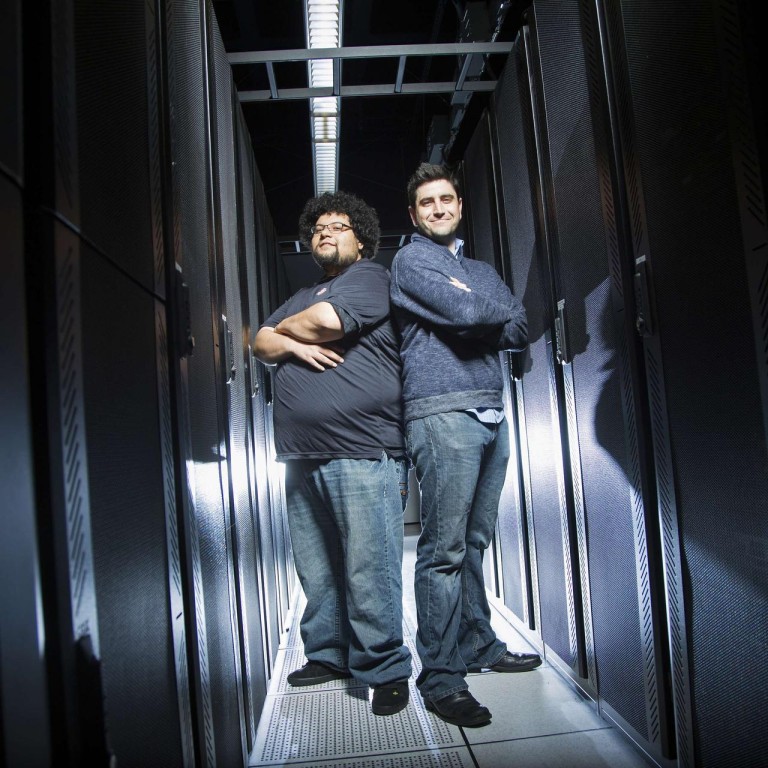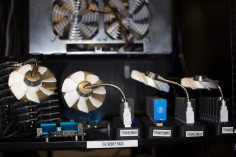
Bitcoin miners find it increasingly hard to make money
It's becoming increasingly tough to earn money from making bitcoins; it's the makers of souped-up computer equipment that are minting it
Tucked away in an airconditioned data centre in Silicon Valley is a hotchpotch of black boxes, circuit boards and cooling fans owned by 27-year-old Aaron Jackson-Wilde, a modern-day prospector looking for bitcoins.
Since discovering the digital currency a few months ago, Jackson-Wilde has paid about US$2,000 for his "rigs", which are powered by specialised computer chips. They are designed to help operate and maintain the bitcoin network - and, in return, generate a small reward in a process known as "bitcoin mining".
A form of electronic money independent of traditional banking, bitcoins started circulating in 2009 and have since become the most prominent of several fledgling digital currencies.
Videographics: What is Bitcoin
While they quickly gained a reputation for facilitating drug deals and money laundering, bitcoins have of late garnered attention from investors, such as venture capital firm Andreessen Horowitz. The volume of transactions using Bitcoins today remains miniscule, but enthusiasts believe the peer-to-peer currency will play a major role in e-commerce and could eventually become as ubiquitous as e-mail.
Bitcoin mining is based on a unique feature of the digital currency. Unlike traditional currencies, where a central bank decides how much money to print based on goals like controlling inflation, no central authority governs the supply of bitcoins.
Instead, bitcoin transactions are tracked by a network of computers that solve complex mathematical problems to validate transactions and prevent counterfeits. The system automatically generates new bitcoins as the maths problems are solved and rewards the computer operators.
In a key twist that keeps inflation in check, the difficulty of the cryptographic maths that leads to newly minted coins grows as more computers join the network.
That has led some technology professionals to target a new market in souped-up computers and specialised chips aimed at the growing ranks of bitcoin "miners".
Consider Ravi Iyengar, who first heard of bitcoins about six months ago. Since then he has quit his job as a senior chip architect at Samsung Electronics and raised US$1.5 million to launch CoinTerra. He says he has already pre-sold more than US$5 million worth of the hardware he has designed for bitcoin mining.
"I've been in arms races throughout my career - AMD, ARM, Intel," said Iyengar, referring to prominent semiconductor companies, "but none of them match the intensity of bitcoin mining. Each month in bitcoin mining is like a year."
Little is known about exactly who started bitcoin, but the concept was introduced in a 2008 paper written under the pseudonym Satoshi Nakamoto. Since then, Satoshi Nakamoto has become sort of a patron saint among advocates pushing for bitcoins as an alternative to national currencies.
Bitcoin is not backed by physical assets, is not run by any person or group, and its value depends on people's confidence in the currency. The dollar price of bitcoins has spiked over the past year as more people became aware of the currency and speculators jumped into the market, which remains highly volatile. Bitcoin recently broke US$200, compared to US$12 a year ago.
The goal of bitcoin miners is to pull in more than what they spend on their rigs - some cost over US$20,000 - and the electricity they need to keep the machines running 24 hours a day.
It has become so hard to make a profit that comparisons to the 19th century California gold rush, when money was often made selling shovels to naive prospectors, have become a running joke among bitcoin miners.


"It's the guys who sell the equipment who are making the money, not the bitcoin miners," said Jackson-Wilde, a manager at a company that makes motorcycle batteries.
CoinTerra believes spending on new bitcoin mining chips could easily hit US$100 million a year for the next three years, assuming no change in prices. While that is peanuts for large semiconductor companies like Intel and Qualcomm, it is a lucrative market for small developers.
About 11.9 million bitcoins, worth US$2.4 billion at recent prices, have been minted since the currency began circulating. Based on recent activity, the network is on track to create around 1.4 million new bitcoins annually over the next three years, the equivalent of more than US$280 million a year at recent exchange rates.
Reflecting growing competition, Jackson-Wilde says his gear - which features model names like Erupter, Jalapeno and Spartan - now pulls in a tiny fraction of the bitcoins it used to, but he expects another US$10,000 worth of next-generation equipment to put him in the black.
Despite the expenditure, he considers himself a hobbyist committed to supporting the bitcoin network rather than a serious digital-currency investor.
"Buying and selling bitcoins is enticing, but it's not as enticing as being part of it and actually having hardware," he said.

